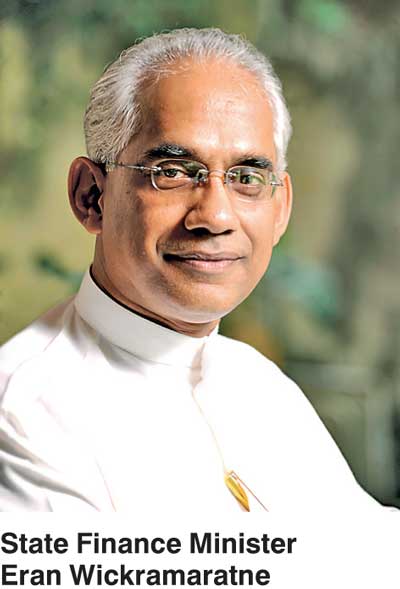Thursday Feb 26, 2026
Thursday Feb 26, 2026
Monday, 1 January 2018 00:00 - - {{hitsCtrl.values.hits}}
By Charumini de Silva
Tax revenue in 2017 has grown by 11.5% to Rs. 1.6 trillion with considerable improvement in income tax as per provisional data.
State Finance Minister Eran Wickramaratne told the Daily FT that collection by the Inland Revenue Department (IRD) has increased by 30% to Rs. 600 billion in 2017 as against Rs. 461 billion in the previous year. Customs Department revenue has increased by 8% to Rs. 900 billion whilst Excise Department revenue collection was 5% lower at Rs. 114 billion.

In 2016, tax revenue increased by 8% to Rs. 1.46 trillion and the 11.5% growth achieved in 2017 reflects an improved performance.
However, the 2017 provisional figure is still lower by Rs. 117 billion compared to the target of Rs. 1.75 trillion (revised) revealed when the Government presented the 2018 Budget in November last year. In the first eight months of 2017, though tax revenue was up 17.5% to Rs. 1.09 trillion, the performance reflected a shortfall of Rs. 92 billion compared to the estimate for the January to August period.
The original estimate for 2017 tax revenue was Rs. 1.82 trillion but was later revised to Rs. 1.75 trillion.
Tax revenue as a percentage of GDP in 2016 was 12.4% and for 2017 the revised target in November was 14.6%.
Wickramaratne attributed reforms introduced to the tax policy and tax administration as factors for improved revenue performance though a delay in implementing the new Inland Revenue Act was a setback. “Although the Government wanted to implement the new Inland Revenue Act from 2017 onwards, we could not implement it as a lot of work went into it. However, it gave time for businesses to adjust to change for the smooth transition from 1 April 2018,” he added.
In that context the State Finance Minister expressed confidence that in 2018 the Government expected higher tax revenue collection from the IRD as the new Inland Revenue Act would be effective from 1 April.
According to the 2018 Budget proposals, the Government is expecting to collect total tax revenue of Rs. 2.03 trillion and tax revenue as a percentage of GDP of 15.2%, up from 14.6% in 2017.
The State Finance Minister insisted Sri Lanka Customs needed to perform better going forward.
“We expect Sri Lanka Customs to perform better than in 2017. I believe that, with most of its payments going to be online from 2018 and e-signatures being accepted by the Department, this will improve the efficiency and simplify the systems,” Wickramaratne stressed.
Commenting on the underperformance of the Excise Department, he said: “If you look at the first nine months, the tax revenue collected by the Department was slow and in the last three months of the year it has picked up the momentum again.”
The downfall in Excise Department collection is largely due to the decline in revenue from liquor and tobacco taxes owing to a drop in consumption or sales following a hike in excise duty rates. For example in the first eight months of 2017, combined revenue collected from excise duty imposed on liquor and cigarettes dropped by 6.9% to Rs. 128.3 billion. Revenue from liquor taxes was down by 6% to Rs. 73.6 billion and the revenue from cigarette products declined by 8% to Rs. 54.6 billion.
Minister Wickramaratne emphasised that sustaining the momentum of revenue mobilisation would be a major policy priority, building on the improved performance in 2017.
“Timely implementation of revenue reforms aimed at streamlining the tax system including the tax legislation, broadening the tax base, rationalising the tax exemptions and concessions as well as strengthening the tax administration will be essential for sustained revenue mobilisation,” the State Finance Minister added.
According to the Finance Ministry, in 2017 several tax reforms have been undertaken to address issues in the tax system to enable the Government to sustainably cover its commitments through broadening the tax base, simplifying the tax system, rationalising tax exemptions and strengthening the tax administration.
The reforms include the increase in Value Added Tax (VAT) rate from 11% to 15%, the expansion of VAT base by reducing the VAT registration threshold and removing several tax exemptions, reducing the threshold level of Nation Building Tax (NBT), the increase of the Economic Service Charge (ESC) rate from 0.25% to 0.5%, the removal of existing exclusion of profit-making business and imposition of ESC at the point of importation on certain goods, the increase in unit rates of excise duty applicable to motor vehicles.
The Excise (Ordinance) Duty on imported foreign liquor was imposed while reducing the allowance for the loss of ethanol by evaporation and leakage in storage and transportation. The tax administration is being strengthened through the commencement of RAMIS and the expansion of this system for major domestic taxes, effective risk-based tax audit, tax consultation and taxpayer services at IRD, Single Window System at SLC to simplify export and import trade and ITMIS at the General Treasury followed by other VAT base broadening reforms.
In addition, the new Inland Revenue Act has been passed in Parliament to simply the tax laws which will help increase the direct tax revenue collection of the Government.
Reforms have been implemented in international trade-related taxes with the introduction of a three-band tariff structure (0, 15 and 30) by replacing a four-band tariff system (0, 7.5, 15 and 25).